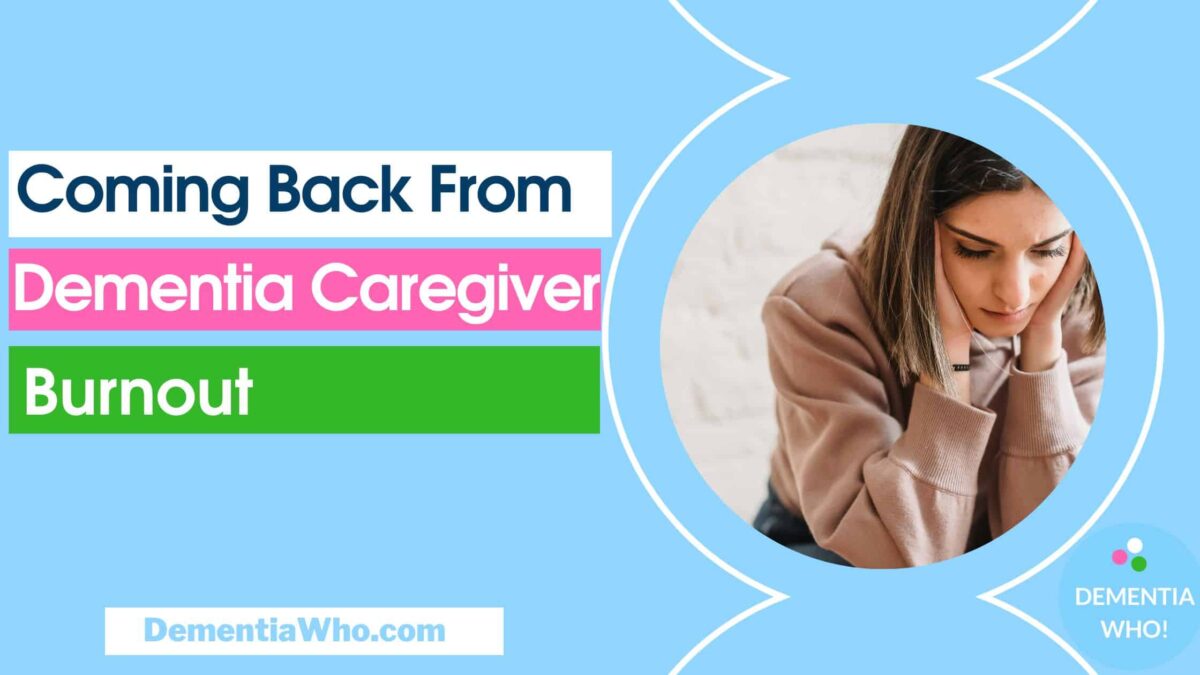I found out the hard way that caregiving can take a toll on your mental, emotional, and physical well-being, leading to dementia caregiver burnout. Whether it’s taking care of aging parents, a friend, sibling or close relatives, dementia caregivers play a vital role in the lives of their loved ones. So I’m sharing the first steps that I’m taking coming back after caregiver burnout to show and help others to recover as well to continue to care for our loved ones.
Related: Dementia Caregiver Fatigue – Harsh Reality
Caregiver burnout is a state of physical, mental, and emotional exhaustion caused by the overwhelming demands of dementia caregiving. It can leave you feeling drained, overwhelmed, and depressed, negatively affecting your ability to provide quality care for your loved one.

I learnt the hard way last week. I’ve been there and survived it again. Despite your best efforts, things do fall by the wayside and the first thing to go is usually taking care of yourself. Here’s my headline advice to you if you’re going through it. Just remember the key is to sustain your actions long term.
My mistake was not doing these steps regularly.
Give Yourself Permission to Rest
This was the biggest lesson for me, giving myself permission to rest. I thought asking for help meant I was weak and felt guilty at the thought of leaving mum with a less experienced family. I thought that I was the only one who could take care of all her needs, but the reality was that I also needed to take care of myself.
Aim to Restore Your Own Wellbeing First
What does that look like for you? Do you need to just sleep or have time for yourself, meet and socialise with others, spend time exercising, or pursuing a hobby you love etc? Whatever fills your heart and improves your wellbeing, identify it and then pursue it with the same level of attentiveness that you care for your loved one.
Allow Others to Help
The next step is finding that help if you have family or friends who offered, then bite their hand off, arrange a time that works for you, your loved one and your friend/family. Allow others to step in and provide care temporarily while you focus on basics: sleeping, healthy food, physical activity.
Let Go of Guilt & Shame
Be compassionate to yourself, forget that shame. You are not being selfish, you’re taking care of you. Think about what you do to make sure everyday things work in your home, so why can’t we do the same for ourselves? Think about that! Do you care for your phone more than yourself, because you charge that everyday, you don’t let it die, do you? No, because you need it, you take care of it by charging it.
Your loved one needs you! So take the time to recharge yourself!
Explore Respite Care Options
Respite services can provide temporary relief, allowing for dementia caregivers to take a much-needed break from the demands of continuous caregiving. I know how hard that can be, to either get access to respite or have someone care for your loved one to take respite. But taking advantage of respite services, can allow you to rest and recharge, attend to personal matters, or simply enjoy a period of relaxation.
Research Availability and Eligibility of Agencies Providing Respite Care
Are there government supported schemes, do you have a volunteer sitting service in your area or a dementia befriending service who could relieve you of caring duties for a few hours?
Draw on Family/Friends Offering Help
Do you have family or friends that have offered help? Can you suggest specific tasks? It doesn’t have to be a whole day. It could be as simple as picking up meds, or a grocery shop or taking your loved one to an appointment for you, etc.
Are Day Groups An Option?
Are there any day programs, church groups – where your loved one can join group activities and spend time socialising with others once or twice a week?
Build Your Circle of Emotional Support
Getting support is essential for caregiver burnout recovery. Joining a support group or connecting with other caregivers can provide a sense of community and understanding. That’s where I went wrong, I’m a loner type and joining a support group was something alien to me, but now I realise that it’s crucial to have that emotional support from others and gain an opportunity to learn valuable insights and get encouragement from others.
Counselling or Therapists
Seek out individual counseling or therapists who understand caregiver challenges. Don’t let this fall by the wayside. Having a therapist or counsellor you can talk to even in the short term can help tremendously in giving you tools and ability to deal with caregiver burnout. The key is to KEEP UP THE PRACTISES YOU LEARN!
Yep, you guessed it; I didn’t. I initially used them to recover but didn’t use them to continue to maintain my overall mental and emotional health, don’t make the same mistakes I did.
Related: Does Counselling Help for Dementia Caregiver Burnout?
Support Groups
Join an in-person or online support group to alleviate isolation. Time gets sucked away from you and you can lose that goal you had of joining an online/face to face support group. Look up local support group options in your area or check online for various groups that offer coffee mornings for dementia caregivers to check in with each other.
Friends and Family
Identify friends/family who will listen without judgement when you are struggling. Do you have that one friend who will listen to you whatever your worries are, even if they don’t seem to change? Or a social media outlet of friends that can help and encourage you when you’re feeling lost?
Embrace Self-Care As Part of the Care Plan
You probably have a care plan for your loved one, either you drew one up or you had help from social services or other organisations to understand the needs of your loved one. So why not one for you too? Do you have a care plan for yourself? That means actively detailing your needs or wants that can ensure you have a better quality of life for you. If not, think about:-
Calendar Blocking
Block off regular windows on your calendar solely for self-care activities. Calendar blocking time in your diary around all those appointments or needs of your loved one, so that you have that time dedicated to yourself.
Stress Management
Focus on stress management outlets that work for you like yoga, massage, creative hobbies
Health & Life Check ins
Maintain medical checkups and monitor your health for signs of recurrent burnout. Let your doctor know that you’re a carer and make sure that you have a regular checkup with them, and highlight any issues you have. Don’t let health issues become bigger because you didn’t prioritise your own health. e.g if you’re not sleeping as I wasn’t, then talk to your doctor to find out what options they have to help, rather than letting it get worse.
Review Your Care Plan
Review your care plan – every quarter or a timeline that feels right for you. Review your health, mental, emotional, physical status, ask yourself several questions about how you’re feeling. Are you really meeting others, making time for yourself, taking up offers of respite?
Now is the time to re-evaluate and make changes if it’s not working, before you get to the next stage towards caregiver burnout.
Remember, you can’t do it all. It will affect you one way or another. You may not fall like I did and become paralysed from caregiver burnout, but you may be left with ongoing problems that last years after caregiving ends. So learn to prioritise yourself and don’t make the same mistakes I did.
Until next week.
Here’s Kikki looking guilty after ripping tags off my rucksack.



